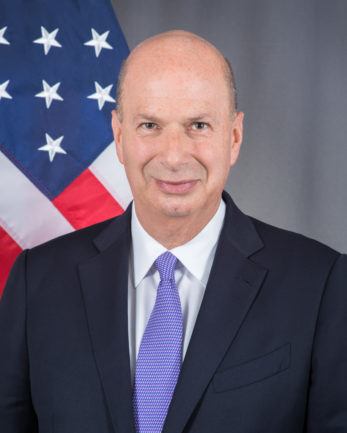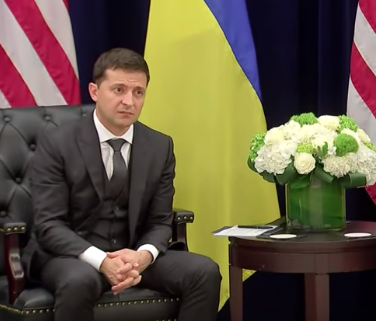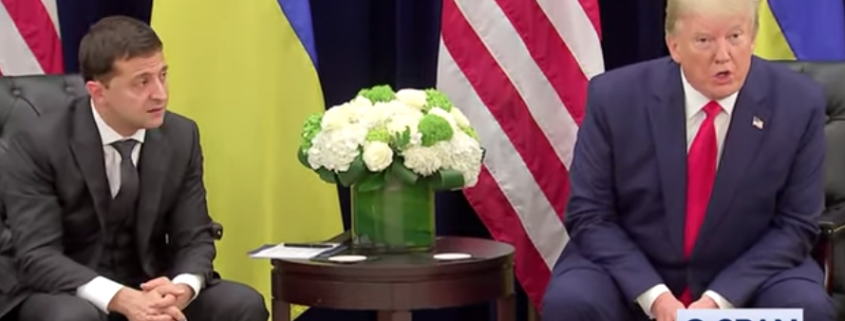The Origin of the Sharpie Quid Pro Quo Denial: An Effort to Craft a Cover Story on the Pages of the WSJ
Before I got caught up in Thanksgiving preparations, I started a post trying to recreate Susan Simpson’s analysis showing that the September 9 “no quid pro quo” call between Trump and Gordon Sondland never actually happened. Thankfully, she was already doing all that work, in a long post at Just Security.
[A]s shown from the testimony of other witnesses, the “no quid pro quo” call did not take place on September 9th. What’s more, the call was not prompted by any text from Bill Taylor. And lastly, Sondland’s testimony about the “no quid pro quo” call omitted the most important part: the part where President Trump informed Sondland that the security assistance would be at a “stalemate” until President Zelenskyy stood in front of a microphone and personally announced that he was opening an investigation into Trump’s political rivals.
Go read her post, which is meticulous and convincing.
Since she’s done that, I’d like to move onto where I had wanted to go from there, to unpack how that less-damning story got seeded.
The story first appears in an October 7 WSJ article purporting to preview Sondland’s testimony. The article was part of a series of articles, all involving Rebecca Balhaus, in which quid pro quo participants Kurt Volker, Sondland, Rick Perry, and Ron Johnson worked out a cover story. (I don’t fault Balhaus, at all, for reporting these stories; she killed the early reporting on this. But it’s quite clear now she was lied to in an effort to coordinate a false story, and she might consider describing how these stories came together given that these sources did lie.)
The stories are designed to take the existing record as reflected in the texts between many of them and come up with a story that denies both that by September 7, Trump had premised aid on investigations into 2016 and Biden, and the following day, Volodymyr Zelensky, agreed to that demand.
Perhaps because he was trying (unsuccessfully) to salvage his position at the McCain Institute, perhaps because he no longer had any legal tie to State, and perhaps because HPSCI got lucky, Kurt Volker testified first, after Mike Pompeo tried and failed to bully the committee into letting State sit in on what its witnesses would say to the committee.
In his statement and testimony, which was bound by the numerous texts he had reflecting discussions relating to the quid pro quo, Volker unconvincingly claimed not to know that when Rudy and the Ukrainians discussed investigating Burisma, everyone involved knew that to be code for Joe Biden. The day after his testimony, HPSCI released the texts he had shared with the committee, showing abundant evidence of a quid pro quo and setting off a bunch of reporting trying to nail down when Trump demanded the quid pro quo.
Ron Johnson then told the WSJ that he had asked Trump whether there was a quid pro quo, and Trump had angrily denied it.
Sen. Ron Johnson said that Gordon Sondland, the U.S. ambassador to the European Union, had described to him a quid pro quo involving a commitment by Kyiv to probe matters related to U.S. elections and the status of nearly $400 million in U.S. aid to Ukraine that the president had ordered to be held up in July.
Alarmed by that information, Mr. Johnson, who supports aid to Ukraine and is the chairman of a Senate subcommittee with jurisdiction over the region, said he raised the issue with Mr. Trump the next day, Aug. 31, in a phone call, days before the senator was to meet with Ukraine’s president, Volodymyr Zelensky. In the call, Mr. Trump flatly rejected the notion that he directed aides to make military aid to Ukraine contingent on a new probe by Kyiv, Mr. Johnson said.
“He said, ‘Expletive deleted—No way. I would never do that. Who told you that?” the Wisconsin senator recalled in an interview Friday. Mr. Johnson said he told the president he had learned of the arrangement from Mr. Sondland.
That claim (which I believe Chris Murphy has challenged; I will return to Johnson’s role in this in a follow-up) in some ways necessitated the September 9 story now shown to be false.
Mr. Johnson’s account of Mr. Sondland’s description of the conditions placed on aid to Ukraine runs counter to what Mr. Sondland told another diplomat a little over a week later.
On Sept. 9, Bill Taylor, a top U.S. diplomat in Kyiv, in a text message to Mr. Sondland also linked the hold on aid to the investigations the president was seeking. “I think it’s crazy to withhold security assistance for help with a political campaign,” Mr. Taylor wrote.
Then, days later, Sondland released to WSJ what would be the first of at least three versions of testimony before he testified (along with the three versions given as testimony), though the WSJ story appears to rely heavily on leaks from Volker’s camp, too. The story appeared to be an attempt to deal with the problem presented by Volker’s testimony: that there was abundant evidence that the Three Amigos were scripting precisely what Zelensky had to say, and that even after (Volker claimed) Ukraine had hesitated, Sondland and Taylor continued to pursue such a statement.
A draft statement subsequently circulated by Mr. Volker included a line that Ukraine investigate “all available facts and episodes, including those involving Burisma and the 2016 U.S. elections.”
Mr. Giuliani didn’t respond to a request for comment.
That statement was ultimately scuttled over concerns in Ukraine about being perceived as wading into U.S. elections, among other matters, according to the person familiar with Mr. Volker’s testimony to House lawmakers.
But Mr. Sondland and Bill Taylor, a top U.S. diplomat in Kyiv, continued to discuss the possibility of having Mr. Zelensky give a media interview in which he would make similar commitments about Ukrainian investigations, according to the person familiar with Mr. Volker’s testimony.
The story also tried to clean up a problem created by Johnson’s claim that Trump had denied there was a quid pro quo.
Mr. Sondland has come under fresh scrutiny in recent days after Sen. Ron Johnson (R., Wis.) told The Wall Street Journal on Friday that Mr. Sondland had told him in August that the decision to hold up nearly $400 million aid to Ukraine was contingent on an investigation desired by Mr. Trump and his allies. Mr. Johnson said the president denied any quid pro quo.
Mr. Sondland doesn’t remember his conversation with the senator that way, according to a person familiar with his activities. He understood the White House visit was on hold until Ukraine met certain requirements, but he didn’t know of a link to the military aid, this person said.
Most importantly, the story shifted the date of Sondland’s call from September 7 to September 9 to shift Bill Taylor’s role in all this.
Yet text messages released by House lawmakers last week suggest some Trump administration officials believed there was a link between the aid to Ukraine and the investigations Mr. Trump sought.
“The nightmare is they give the interview and don’t get the security assistance,” Mr. Taylor wrote in a Sept. 8 text message to Mr. Volker and Mr. Sondland, referring to the interview they had discussed Mr. Zelensky giving about investigations.
The next day, Mr. Taylor told Mr. Sondland: “I think it’s crazy to withhold security assistance for help with a political campaign.”
Mr. Sondland called Mr. Trump before texting back less than five hours later, according to the person familiar with his activities.
“The President has been crystal clear no quid pro quo’s of any kind,” Mr. Sondland said. He added: “I suggest we stop the back and forth by text.”
This is when that lie was formed: after the limits imposed by Volker’s texts became clear.
Rick Perry then did an interview with the WSJ where he joined in the feigned ignorance that this was about Biden from the start, presenting the cover story Republicans would use since then, that this was just about Trump believing he was targeted in 2016.
Mr. Perry, in an exclusive interview with The Wall Street Journal, said he contacted Mr. Giuliani in an effort to ease a path to a meeting between Mr. Trump and his new Ukrainian counterpart. He said Mr. Giuliani described to him during their phone call several concerns about Ukraine’s alleged interference in the 2016 U.S. election, concerns that haven’t been substantiated.
Mr. Perry also said he never heard the president, any of his appointees, Mr. Giuliani or the Ukrainian regime discuss the possibility of specifically investigating former Vice President Joe Biden, a Democratic presidential contender, and his son Hunter Biden. Mr. Trump’s request for a probe of the Bidens in a July 25 call with Ukraine’s president has sparked the impeachment inquiry in the House.
[snip]
“And as I recall the conversation, he said, ‘Look, the president is really concerned that there are people in Ukraine that tried to beat him during this presidential election,’ ” Mr. Perry said. “ ‘He thinks they’re corrupt and…that there are still people over there engaged that are absolutely corrupt.’ ”
Mr. Perry said the president’s lawyer didn’t make any explicit demands on the call. “Rudy didn’t say they gotta do X, Y and Z,” Mr. Perry said. “He just said, ‘You want to know why he ain’t comfortable about letting this guy come in? Here’s the reason.’ ”
In the phone call, Mr. Giuliani blamed Ukraine for the dossier about Mr. Trump’s alleged ties to Russia that was created by a former British intelligence officer, Mr. Perry said, and asserted that Ukraine had Mrs. Clinton’s email server and “dreamed up” evidence that helped send former Trump campaign chairman Paul Manafort to jail.
Perry also floated a version of the July 10 meeting that downplays how aggressively this tied the investigation to any call.
During that meeting, U.S. officials including Mr. Volker and Mr. Perry pushed for a call to be scheduled between Mr. Trump and Mr. Zelensky as a U.S. show of support for the new administration, according to people familiar with the conversation. Also during the meeting, Mr. Sondland brought up investigations the president was interested in Ukraine pursuing, a move that so alarmed Mr. Bolton and Fiona Hill , the top Russia adviser at the time, that Ms. Hill subsequently relayed her concerns to a National Security Council lawyer, Ms. Hill told House committees earlier this week.
After that meeting, Mr. Perry learned that administration aides had been told a call between Messrs. Trump and Zelensky didn’t need to be scheduled until they had something substantive to discuss, according to a person familiar with the matter. Mr. Perry called Mr. Bolton on July 11 and again pressed for the two leaders to speak ahead of parliamentary elections on July 21, stressing that a call was needed to build the relationship and help counter Russian influence in Ukraine. Mr. Perry at that point also brought up investigations, reiterating that Mr. Zelensky was committed to rooting out corruption and wouldn’t prove an obstacle to any probes, the person said.
In the same interview, Perry curiously backed off previous reporting he was about to leave the Administration.
Those are the various narratives into which Sondland tried to squeeze his first sworn statement to Congress, one that he has had to revise twice.
And then Bill Taylor testified, which is when it became clear he had abundant notes that contradicted Sondland’s cover story.
October 3: Volker testimony (opening statement, deposition transcript)
October 4: HPSCI releases Volker texts; Ron Johnson claims to WSJ that Trump told him aid was not premised on an investigation
October 7: Sondland provides advance notice of purported testimony to WSJ and others that includes a fake September 9 call
October 12: Sondland releases a second version of testimony
October 14: Sondland releases a third version of testimony; Fiona Hill testimony
October 15: Leaks of Fiona Hill’s testimony creates problems around the July 10 meeting
October 16: Rick Perry interview with WSJ
October 17: Sondland opening statement, deposition
October 22: William Taylor testifies



